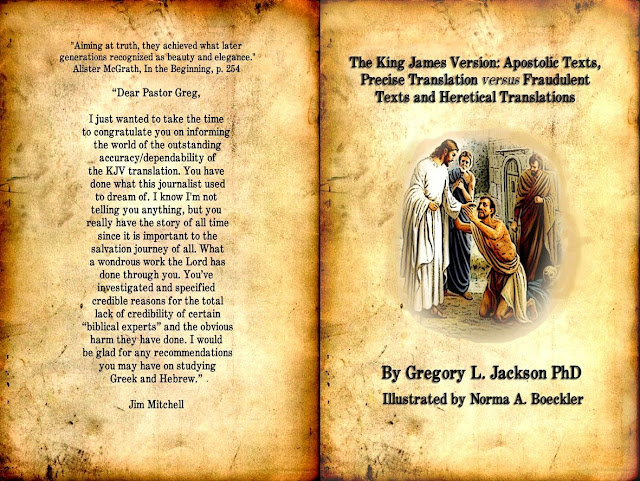 |
| The King James Version |
Reviewed in the United States on April 22, 2022
Gregory L Jackson PhD is a Lutheran theologian, teacher, and pastor. He received a STM degree in Biblical studies from Yale in 1973 and he earned a Master's degree and a PhD in theology at the University of Notre Dame in 1982.
The purpose of the Bible is to instill faith. Faith is the instrument God uses to save us. Doubt is the instrument the devil uses to lead us away from God.
In his previous book on the King James Version (KJV), Dr Jackson demonstrated that the KJV is an inspired and trustworthy translation, and it is the Bible which faithful English-speaking Christians should read. He described how the authentic texts of the Bible were preserved and passed down by faithful men as what we call the Majority Texts, and how they were translated into English by faithful men.
In this book, Dr Jackson demonstrates that “modern” Bible translations (such as the RSV and NIV) are neither inspired nor trustworthy. They are based on defective texts, translated by faithless men.
On page 1, Dr Jackson provides the following quote from the Trinitarian Bible Society regarding the problem with modern translations:
“Today there is an artificially produced conviction resulting from marketing techniques and imposed on the churches from without. This whole modern consensus maintains the Bible publishing industry must now determine the texts of Scripture.
The Church ... has abdicated her role as guardian of the Bible and has turned such responsibility to hirelings who market various, conflicting translations to the confusion and disarray of the Church.”
Dr Jackson provides an overview of the actions of several persons who brought us to this state: Constantine Tischendorf with his 'discovery' of Codices Sinaiticus and Vaticanus which he claimed were the world's oldest and best Bibles, Wescott and Hort with their redacted Greek New Testament which removed references to miracles and the divinity of Jesus, and Eugene Nida with his dynamic-equivalent, paraphrase translations in which essential doctrines are watered-down so as to make them acceptable to Roman Catholics and other apostates.
Dr Jackson also provides an extensive lists of books which the reader may use to make a deep-dive study of the issues behind deficiencies in modern Bible translations. Therefore, one can use this book as an overview of the issues as well as a reference source for further study.
I would recommend this book to someone who wishes to learn about the deficiencies of 'modern' Bible translations and how such defective Bibles have contributed to the apostasy which we see today in mainline denominations.
The purpose of the Bible is to instill faith. Faith is the instrument God uses to save us. Doubt is the instrument the devil uses to lead us away from God.
In his previous book on the King James Version (KJV), Dr Jackson demonstrated that the KJV is an inspired and trustworthy translation, and it is the Bible which faithful English-speaking Christians should read. He described how the authentic texts of the Bible were preserved and passed down by faithful men as what we call the Majority Texts, and how they were translated into English by faithful men.
In this book, Dr Jackson demonstrates that “modern” Bible translations (such as the RSV and NIV) are neither inspired nor trustworthy. They are based on defective texts, translated by faithless men.
On page 1, Dr Jackson provides the following quote from the Trinitarian Bible Society regarding the problem with modern translations:
“Today there is an artificially produced conviction resulting from marketing techniques and imposed on the churches from without. This whole modern consensus maintains the Bible publishing industry must now determine the texts of Scripture.
The Church ... has abdicated her role as guardian of the Bible and has turned such responsibility to hirelings who market various, conflicting translations to the confusion and disarray of the Church.”
Dr Jackson provides an overview of the actions of several persons who brought us to this state: Constantine Tischendorf with his 'discovery' of Codices Sinaiticus and Vaticanus which he claimed were the world's oldest and best Bibles, Wescott and Hort with their redacted Greek New Testament which removed references to miracles and the divinity of Jesus, and Eugene Nida with his dynamic-equivalent, paraphrase translations in which essential doctrines are watered-down so as to make them acceptable to Roman Catholics and other apostates.
Dr Jackson also provides an extensive lists of books which the reader may use to make a deep-dive study of the issues behind deficiencies in modern Bible translations. Therefore, one can use this book as an overview of the issues as well as a reference source for further study.
I would recommend this book to someone who wishes to learn about the deficiencies of 'modern' Bible translations and how such defective Bibles have contributed to the apostasy which we see today in mainline denominations.
